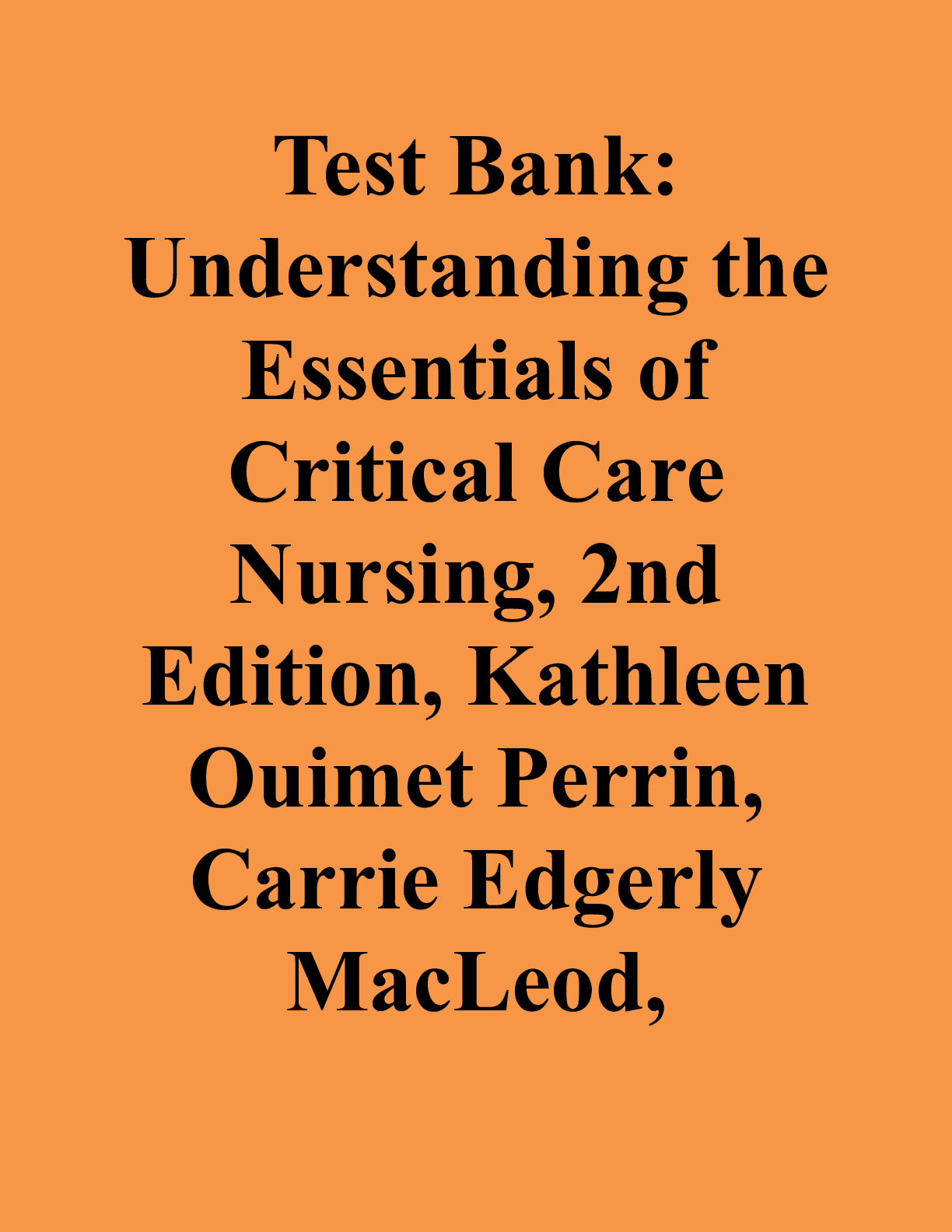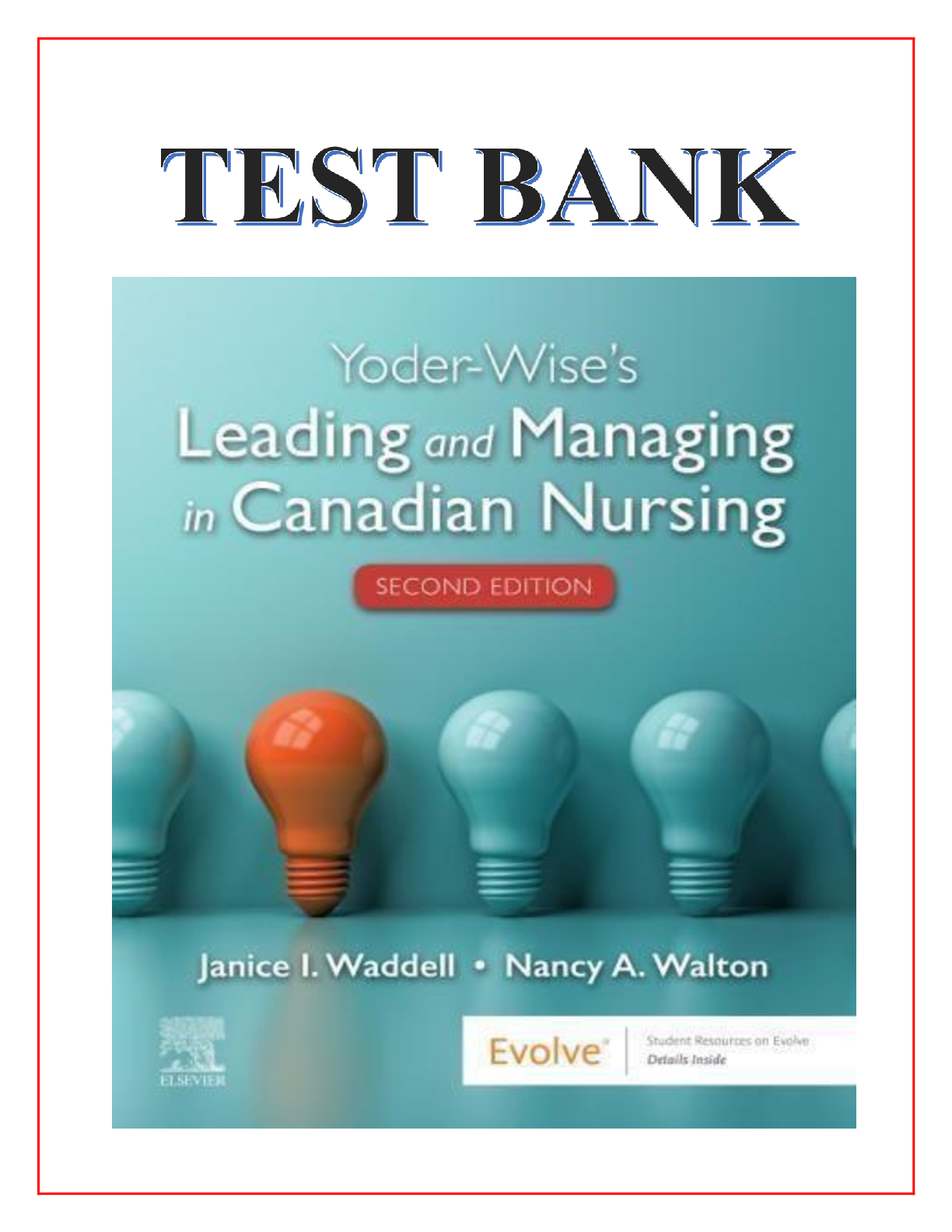*NURSING > TEST BANK > Test Bank: Understanding the Essentials of Critical Care Nursing, 2nd Edition, Kathleen Ouimet Perri (All)
Test Bank: Understanding the Essentials of Critical Care Nursing, 2nd Edition, Kathleen Ouimet Perrin, Carrie Edgerly MacLeod,
Document Content and Description Below
Perrin, Understanding the Essentials of Critical Care Nursing, 2/e Chapter 1 Question 1 Type: MCSA Which patient would the nurse identify as experiencing a critical illness? The patient: 1. With ... chronic airflow limitation whose VS are BP 110/72, P 110, R 16 2. With acute bronchospasm and whose VS are BP 100/60, P 124, R 32 3. Who was involved in a motor vehicle crash whose VS are BP 124/74, P 74, R 18 4. On hemodialysis for chronic renal failure with no urine output and whose VS are BP 98/50, P 108, R 12 Correct Answer: 2 Rationale 1: The blood pressure and respiratory rate are considered within normal limits. The heart rate is slightly elevated. Based upon these vital signs, this patient is not critically ill. Rationale 2: Acute bronchospasm can present a life-threatening situation, which can jeopardize a patient's survival. The patient’s pulse and respiratory rate are elevated, which could indicate a critical illness. Rationale 3: According to the vital signs, this patient is not critically ill despite being in a motor vehicle crash. Rationale 4: The patient on receiving hemodialysis for chronic renal failure is not considered critically ill unless another disease process or health issue develops. The patient’s vital signs are consistent with someone with chronic renal failure. Global Rationale: Cognitive Level: Analyzing Client Need: Physiological Integrity Client Need Sub: Physiological Adaptation Nursing/Integrated Concepts: Nursing Process: Assessment Learning Outcome: 1-1: Define critical care. Question 2 Type: MCMA Of the following patients, which will the nurse expect to be transferred to a critical care unit? The patient: Note: Credit will be given only if all correct choices and no incorrect choices are selected. Standard Text: Select all that apply.Perrin, Understanding the Essentials of Critical Care Nursing, 2/e Test Bank Copyright 2012 by Pearson Education, Inc. 1. With an acetaminophen overdose 2. Suffering from acute mental illness 3. With chronic renal failure 4. With acute decompensated heart failure 5. With bacteremia from an infected foot wound Correct Answer: 1,4,5 Rationale 1: Critical care units are cost-efficient units for caring for patients with specific organ system failure. Patients with acetaminophen overdose often suffer liver failure as a consequence. Rationale 2: A patient with acute mental illness would not receive care in a critical care unit. This health problem would be considered noncritical. Rationale 3: Even though critical care units are cost-efficient units for caring for patients with specific organ system failure, chronic renal failure is not a disease process necessitating the critical care environment. Rationale 4: The patient with acute decompensated heart failure would receive care in a critical care unit. This patient has a specific organ that has failed. Rationale 5: Bacteremia can affect many organs and lead to multisystem organ failure. This patient would receive care in a critical care unit. Global Rationale: Cognitive Level: Analyzing Client Need: Physiological Integrity Client Need Sub: Physiological Adaptation Nursing/Integrated Concepts: Nursing Process: Assessment [Show More]
Last updated: 4 years ago
Preview 1 out of 29 pages

Buy this document to get the full access instantly
Instant Download Access after purchase
Buy NowInstant download
We Accept:

Reviews( 0 )
$10.00
Can't find what you want? Try our AI powered Search
Document information
Connected school, study & course
About the document
Uploaded On
May 21, 2021
Number of pages
29
Written in
Additional information
This document has been written for:
Uploaded
May 21, 2021
Downloads
0
Views
14


.png)







.png)




.png)








